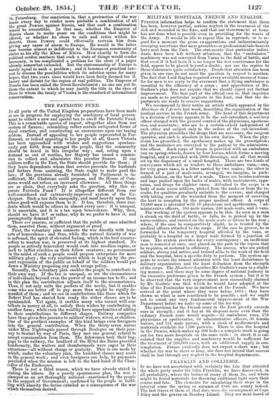THE PATRIOTIC FUND.
IN all parts of the 'United Xingdom preparations have been made or are in progress for employing the machinery of local govern- ment to collect a new and special tax to swell the Patriotic Fund. This is a remarkable species of impost, altogether alien from our system of finance; resembling rather certain antiquated forms of royal exaction, and constituting an excrescence upon our taxing system. Instead of appealing to her people represented in Par- liament, or indeed appealing to her people at all, Queen Victoria has been approached with wishes and suggestions spontane- ously put forth from amongst the people, that the community should be taxed in this irregular was; and, acting upon a demand so out of rotitine, her Majesty has issued a commis- sion to collect and administer this peculiar finance. If our soldiers suffer in the East, the 'State should .provide for them ; if they leave dependents whom that service prevents the husbands and fathers from assisting, the State ought to make good the loss; if the provision already furnished by Parliament is in- sufficient; Mr. Gladstone could propose, and the House of Com- mons would not refuse, an increased allowance. All these things are so plain, that everybody asks the question, why this se- parate Patriotic Fund ? It is altogether different from our well-considered and extensively-improved system of the Ex- chequer. Stich a tax falls unequally, and most heavily upon those whose good-will exposes them to it. It has, therefore, three inci- dents which would be odious in almost every case : it is unequal, it is uncertain, and it is a tax upon benevolence. Why, then, should we have it? or rather, 'why do we prefer to have it, and peremptorily demand it? There are reasons, so sufficient that the public at once admitted them, asserted them without argument or proof. First, the volunta;y plan connects the war directly with large acts of benevolence ; and thus, while the natural ferocity of war is softened, the spirit of elevated feeling, which is the best counter- action to wanton war, is preserved at its highest standard. No people so actively benevolent would rush into needless rapine, or seek to inflict cruelties on their fellow creatures; no government in the midst of such a people could propose enterprises for mere military glory ; the very sentiment which is kept up by the pre- sent expression of the public on behalf of the soldiers would put down a Ministry proposing any such savage policy. Secondly, the voluntary plan enables the people to contribute in their own way. If the tax is unequal, so are the circumstances of individuals beyond even the power of an income-tax to fit ; and in this plan the contribution adjusts itself to the circumstances. Thus, it not only suits the pockets of the needy, but it enables some who are 'better off to pay more than might be rigidly de- manded of them ; and we see in contributions like those which Sir Robert Peel has started how ready the richer classes are to be openhanded. Yet again, it enables many who cannot well con- tribute in money at all, to satisfy their wishes by contributing in another form; while even the wealthy have opportunities of adding to their contributions in different shapes. Railway companies have thus given free journies to soldierg' widows, wives, or children. One of the prettiest examples of this kind brings even foreigners into the general contribution. When the thirty-seven nurses under 7ifiss Nightingale passed through Boulogne on their jour- ney to &uteri by way of Paris, they met one general refusal to accept remuneration from them. The fishwomen took their bag- gage to the railway, the landlord of the Hotel des Rains provided handsomely, the waiters and chambermaids were eager in their attentions—all without charge or gratuity. This is one mode by which, under the vcduntary plan, the humblest classes may assist in the general 'work; and even foreigners can help, by payments precluded when the mission is left to the hard hand of the Chan- cellor of the Exchequer. There is yet a third reason, which we have already stated in stating the others. By a purely spontaneous plan, the war is stamped as an act thoroughly national—sanctioned by the people in the support of Government; confirmed by the people in fulfil- ling with alacrity the duties entailed as a consequence of the war which themselves desired.


























 Previous page
Previous page